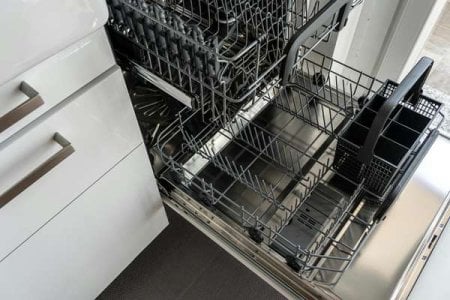Aussies Shocked by Disturbing Dishwasher Find: See Why They're Outraged!
By
Danielle F.
- Replies 9
In the realm of household chores, dishwashers have revolutionized the way we approach the tedious task of washing up after meals. They're the unsung heroes of the kitchen, saving time and water, and generally making life easier for families across Australia. However, what happens when this staple of modern convenience becomes a source of concern and confusion?
Recently, an Australian mum's alarming discovery about her dishwasher has sparked a nationwide conversation about the effectiveness and safety of dishwasher detergents. The mum shared her experience online, posting a photo of her dishwasher filter coated in a mysterious papery residue after using a Finish dishwasher tablet. 'This is what a Finish tablet does to a dishwasher filter in 2 weeks. Wondering how much plastic is actually landing on the dishes? Anyone experienced this?' she queried, seeking answers from fellow Aussies.
The post quickly became a hot topic, with responses pouring in and opinions divided. Some users were quick to defend their own practices, stating they had never encountered such an issue despite using the same product. 'This doesn’t happen to mine,' one member commented, while another added, 'I’ve used Finish tablets for years and never seen anything like that.'
On the other hand, some suggested that the residue was a result of fat and oil build-up, recommending hotter wash cycles and regular filter cleaning to prevent such occurrences. 'That’s fat and oil build-up, not plastic. If you put oily stuff in there you need to use the hotter wash option and clean the filter afterwards,' one user advised.
The debate didn't stop there, with some offering DIY cleaning solutions like a bicarb clean, while others speculated on technical issues such as the dishwasher's temperature settings or the quality of the tablets themselves.
To shed light on the situation, Chris Barnes, a home appliance expert from CHOICE, weighed in on the matter. According to Barnes, the gunk observed could be a mix of partly dissolved plastic wrapper, undissolved detergent, and general kitchen grease and dirt. He emphasized that such residue is not typical and could potentially be redeposited onto dishes, posing a health risk.
Barnes also pointed out that this kind of build-up could have long-term detrimental effects on the dishwasher itself, potentially clogging the filter and drainage pipes, and reducing the machine's effectiveness. He suggested several factors that might contribute to the problem, including inappropriate program settings, issues with automatic sensing programs, a dirty filter, incorrect loading, or simply poor quality of the dishwasher or detergent tablet.
For our senior readers who rely on dishwashers for their convenience and efficiency, this news might be particularly concerning. It's essential to ensure that your dishwasher is not only cleaning your dishes but also operating in a safe and hygienic manner. Here are some tips to keep your dishwasher in top shape:
1. Regular Maintenance: Clean your dishwasher filter every week or two with hot water to remove grease and debris. An occasional deep clean of the entire dishwasher can also help maintain its performance.
2. Choose the Right Settings: Make sure you're using the appropriate wash cycle for your load. If you're dealing with heavily soiled dishes, a hotter and more intensive cycle may be necessary to fully dissolve detergent tablets.
3. Avoid Overloading: Ensure that your dishwasher is not overloaded and that items are stacked correctly to allow for proper water circulation and spray arm movement.
4. Quality Counts: Invest in a good quality dishwasher and detergent tablets. Sometimes, the problem may lie with the products themselves.
5. Pre-Rinse with Caution: If you pre-rinse dishes, be aware that it might affect the automatic sensor in your dishwasher, leading to less effective wash cycles.
The dishwasher debacle serves as a reminder that even the most reliable appliances require attention and care. By following these guidelines, you can help prevent unwelcome surprises and keep your dishwasher running smoothly.

We'd love to hear from you, our Seniors Discount Club members. Have you ever encountered a similar issue with your dishwasher? What are your go-to solutions for keeping your dishwasher clean and functional? Share your experiences and tips in the comments below, and let's help each other keep our kitchens safe and sparkling!
Recently, an Australian mum's alarming discovery about her dishwasher has sparked a nationwide conversation about the effectiveness and safety of dishwasher detergents. The mum shared her experience online, posting a photo of her dishwasher filter coated in a mysterious papery residue after using a Finish dishwasher tablet. 'This is what a Finish tablet does to a dishwasher filter in 2 weeks. Wondering how much plastic is actually landing on the dishes? Anyone experienced this?' she queried, seeking answers from fellow Aussies.
The post quickly became a hot topic, with responses pouring in and opinions divided. Some users were quick to defend their own practices, stating they had never encountered such an issue despite using the same product. 'This doesn’t happen to mine,' one member commented, while another added, 'I’ve used Finish tablets for years and never seen anything like that.'
On the other hand, some suggested that the residue was a result of fat and oil build-up, recommending hotter wash cycles and regular filter cleaning to prevent such occurrences. 'That’s fat and oil build-up, not plastic. If you put oily stuff in there you need to use the hotter wash option and clean the filter afterwards,' one user advised.
The debate didn't stop there, with some offering DIY cleaning solutions like a bicarb clean, while others speculated on technical issues such as the dishwasher's temperature settings or the quality of the tablets themselves.
To shed light on the situation, Chris Barnes, a home appliance expert from CHOICE, weighed in on the matter. According to Barnes, the gunk observed could be a mix of partly dissolved plastic wrapper, undissolved detergent, and general kitchen grease and dirt. He emphasized that such residue is not typical and could potentially be redeposited onto dishes, posing a health risk.
Barnes also pointed out that this kind of build-up could have long-term detrimental effects on the dishwasher itself, potentially clogging the filter and drainage pipes, and reducing the machine's effectiveness. He suggested several factors that might contribute to the problem, including inappropriate program settings, issues with automatic sensing programs, a dirty filter, incorrect loading, or simply poor quality of the dishwasher or detergent tablet.
For our senior readers who rely on dishwashers for their convenience and efficiency, this news might be particularly concerning. It's essential to ensure that your dishwasher is not only cleaning your dishes but also operating in a safe and hygienic manner. Here are some tips to keep your dishwasher in top shape:
1. Regular Maintenance: Clean your dishwasher filter every week or two with hot water to remove grease and debris. An occasional deep clean of the entire dishwasher can also help maintain its performance.
2. Choose the Right Settings: Make sure you're using the appropriate wash cycle for your load. If you're dealing with heavily soiled dishes, a hotter and more intensive cycle may be necessary to fully dissolve detergent tablets.
3. Avoid Overloading: Ensure that your dishwasher is not overloaded and that items are stacked correctly to allow for proper water circulation and spray arm movement.
4. Quality Counts: Invest in a good quality dishwasher and detergent tablets. Sometimes, the problem may lie with the products themselves.
5. Pre-Rinse with Caution: If you pre-rinse dishes, be aware that it might affect the automatic sensor in your dishwasher, leading to less effective wash cycles.
The dishwasher debacle serves as a reminder that even the most reliable appliances require attention and care. By following these guidelines, you can help prevent unwelcome surprises and keep your dishwasher running smoothly.
Key Takeaways
- An Aussie mum discovered a puzzling residue on her dishwasher filter after using Finish dishwasher tablets.
- The residue was initially thought to be plastic but was identified as a combination of undissolved tablet wrapper, detergent, grease and dirt that could affect health.
- Social media users debated the cause, with suggestions ranging from oil build-up to incorrect dishwasher usage and settings.
- A home appliance expert advised checking the program settings, cleaning the filter regularly, ensuring correct loading, and considering the quality of both the dishwasher and the tablets used.








